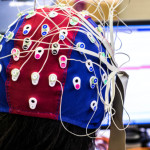
“Sound is a powerful, invisible force that is central to human communication,” Kraus elaborated. “Everyday listening experiences bootstrap language development by cluing children in on which sounds are meaningful. If a child can’t make meaning of these sounds through the background noise, he or she won’t develop the linguistic resources needed when reading instruction begins.” For the study, electroencephelography (EEG) wires were placed on children’s scalps, allowing researchers to clearly see how well the brain extracted meaning out of controlled audio stimulus and speech. The EEG assessments predicted with high accuracy how a three year old child would perform on a literacy skills test one year later. “The importance of our biological approach is that we can see how the brain makes sense of sound and its impact for literacy, in any child,” said Kraus. “It’s unprecedented to have a uniform biological metric we can apply across ages.”
#literacy #language #neuroscience





